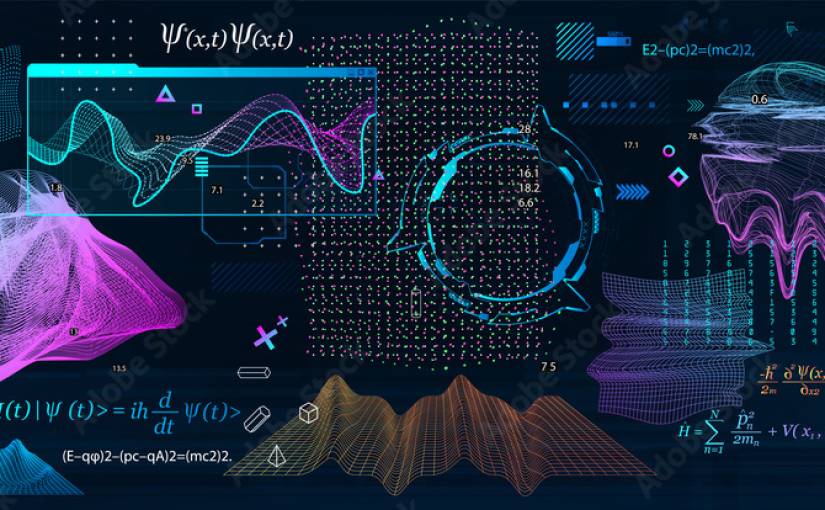Quantum machine learning offers immense potential for advanced data analysis and problem solving. We will explore the exciting possibilities that arise from the combination of quantum computing and machine learning techniques.
Quantum machine learning (qml) is a rapidly developing field that holds great promise for revolutionizing various industries. By harnessing the power of quantum computing, qml aims to enhance and optimize traditional machine learning algorithms, enabling faster and more accurate data analysis.
The unique properties of quantum systems, such as superposition and entanglement, can potentially provide exponential computational speedup and overcome current limitations in classical computing. The fusion of quantum computing and machine learning opens up new avenues for tackling complex problems, ranging from drug discovery and optimization in various industries to financial modeling and image recognition. Additionally, qml has the potential to improve the efficiency of existing machine learning algorithms and enhance their capability to handle large datasets. As quantum computers become more accessible and advancements in qml continue, it is crucial to explore the potential applications, challenges, and future directions of this emerging field. We will delve into the potential of quantum machine learning and discuss how it may shape the future of data analysis and problem solving.

Credit: passionist.org
Understanding The Intersection Of Quantum Computing And Machine Learning
Discover the potential of quantum machine learning by exploring the exciting intersection of quantum computing and machine learning. Uncover the limitless possibilities of combining these cutting-edge technologies to revolutionize various fields and drive innovation.
Exploring The Potential Of Quantum Machine Learning
Quantum computing and machine learning are two fields that hold immense potential for transforming various industries. The convergence of these two disciplines, known as quantum machine learning, opens up new possibilities for solving complex problems and achieving breakthrough advancements. By harnessing the power of quantum computing’s exponential computing power and machine learning algorithms’ ability to extract insights from data, researchers aim to push the boundaries of what is currently possible in artificial intelligence.
In this section, we will explore the potential of combining quantum computing and machine learning and delve into the advantages and challenges of this emerging field.
To truly grasp the potential of quantum machine learning, it is essential to understand the intersection where quantum computing and machine learning converge. Here are some key points:
- Quantum computing:
- Quantum computing employs the principles of quantum mechanics to perform calculations that classical computers struggle with.
- Quantum bits, or qubits, enable parallel processing and superposition, allowing computations to be carried out simultaneously and in multiple states.
- Quantum computers have the potential to solve computationally complex problems exponentially faster than classical computers.
- Machine learning:
- Machine learning algorithms enable computers to learn and improve from data without being explicitly programmed.
- Supervised, unsupervised, and reinforcement learning are the main branches of machine learning, each with its own strengths and applications.
- Machine learning algorithms can discern patterns and insights from vast amounts of data, leading to innovative solutions and predictive models.
The combination of quantum computing and machine learning brings together the speed and power of quantum processing with the ability to learn and gain insights from data. By leveraging qubits for machine learning tasks, researchers hope to tackle problems that are currently intractable for classical computers.
The Advantages And Challenges Of Quantum Machine Learning
Quantum machine learning presents several advantages and challenges that contribute to its evolving nature. Let’s take a closer look:
Advantages:
- Enhanced computing power:
- Quantum computers have the potential to solve complex optimization problems exponentially faster compared to classical computing methods.
- This speed boost can significantly improve the efficiency of machine learning algorithms, allowing for faster training and modeling.
- Improved data processing capabilities:
- The ability of quantum computers to handle large datasets in parallel can enhance data preprocessing and enable more accurate and insightful analysis.
- Quantum algorithms can potentially identify intricate patterns and correlations that classical machine learning methods may overlook.
- Potential for solving previously intractable problems:
- Quantum machine learning holds promise in fields such as drug discovery, logistics optimization, financial modeling, and cryptography, where classical computing falls short.
- Problems that involve large-scale optimization, simulation, and pattern recognition may benefit from the amalgamation of quantum computing and machine learning.
Challenges:
- Fragility of qubits:
- Qubits are sensitive to environmental factors and noise, which can lead to errors in computations.
- Protecting qubits from decoherence and minimizing information loss pose significant challenges for building reliable and scalable quantum computing systems.
- Complexity of quantum algorithms:
- Developing quantum machine learning algorithms that can run efficiently and reliably on real-world quantum hardware is a complex task.
- The translation of classical machine learning algorithms to quantum frameworks requires careful consideration and optimization.
- Limited quantum hardware availability:
- Quantum hardware is still in its nascent stages, with limited access and scalability.
- The scarcity of quantum processors hinders widespread adoption and experimentation with quantum machine learning methods.
The fusion of quantum computing and machine learning presents a compelling frontier for scientific and technological exploration. While the advantages of quantum machine learning are enticing, overcoming challenges related to qubit fragility, algorithm complexity, and hardware availability is essential for its successful implementation.
The ongoing research and development efforts in this space hold the potential to reshape various industries and pave the way for unprecedented advancements in artificial intelligence.
Harnessing Quantum Entanglement For Enhanced Data Processing
Harnessing quantum entanglement to enhance data processing is a promising frontier in quantum machine learning. By utilizing the unique properties of entangled particles, this technology has the potential to revolutionize data analysis and computation, opening up new possibilities in various industries.
Quantum machine learning has opened up new possibilities in the field of data processing, thanks to the powerful phenomena of quantum entanglement and superposition. By harnessing these quantum principles, researchers and scientists are revolutionizing the way data is analyzed and processed in the realm of machine learning.
In this section, we will explore how quantum entanglement can enhance data processing, along with the concept of quantum superposition and its impact on data analysis.
How Quantum Entanglement Can Revolutionize Data Processing In Machine Learning:
- Quantum entanglement allows for the creation of qubits that are interconnected, enabling the simultaneous manipulation of multiple variables and exponentially increasing computational power. This means that with a quantum computer, machine learning algorithms can process vast amounts of data at an unprecedented speed.
- Quantum entanglement enables the generation of highly correlated states, making it possible to capture complex patterns and relationships within datasets. As a result, machine learning models can make more accurate predictions and decisions based on this enhanced understanding of the data.
- Quantum entanglement also offers the potential for secure communication and privacy protection in machine learning applications. Because of the inherent correlations between entangled particles, any attempts to tamper with or eavesdrop on the data would be immediately detectable, ensuring the integrity of the information.
The Concept Of Quantum Superposition And Its Impact On Data Analysis:
- Quantum superposition allows qubits to exist in multiple states simultaneously, exponentially increasing the range of possibilities that can be explored during data analysis. This means that machine learning algorithms can consider and evaluate multiple hypotheses or solutions simultaneously, leading to more comprehensive and efficient data analysis.
- Quantum superposition enables the exploration of parallel processing, where computations can be performed on multiple paths simultaneously. This allows for the exploration of various possibilities for data manipulation and analysis, ultimately leading to faster and more accurate results.
- Quantum superposition also offers the potential for enhanced optimization algorithms in machine learning. By exploiting the multiple states of qubits, these algorithms can efficiently search for optimal solutions in complex data sets, leading to improved performance and decision-making.
The combination of quantum entanglement and superposition holds great potential for revolutionizing data processing in machine learning. These quantum phenomena enable the simultaneous manipulation and analysis of vast amounts of data, resulting in improved accuracy, efficiency, and security. As researchers continue to explore and harness the power of quantum machine learning, we can expect exciting advancements in data analysis and processing that will shape the future of artificial intelligence.
Quantum Machine Learning Applications: Unleashing Innovative Solutions
Discover the untapped potential of quantum machine learning and how it is revolutionizing innovation and problem-solving with cutting-edge applications. Harness the power of quantum computing to unlock new possibilities in the world of machine learning.
As the field of quantum computing continues to advance, its integration with machine learning has opened up new possibilities for solving complex problems and unlocking innovative solutions. Quantum machine learning combines the power of quantum computing with the principles of machine learning, resulting in groundbreaking applications that have the potential to revolutionize various industries.
In this section, we will explore three key areas where quantum machine learning is making significant strides: quantum algorithms for optimization problems in machine learning, quantum-based techniques for dimensionality reduction in large datasets, and quantum machine learning for pattern recognition and anomaly detection.
Quantum Algorithms For Optimization Problems In Machine Learning:
- Quantum computers can leverage their unique properties, such as superposition and entanglement, to develop algorithms that efficiently solve optimization problems. These algorithms offer a potential speedup compared to classical approaches.
- By harnessing quantum algorithms, machine learning models can optimize parameters more effectively, leading to improved predictive accuracy and faster training.
- Quantum optimization algorithms show promise in various machine learning tasks, including feature selection, hyperparameter tuning, and model optimization.
Quantum-Based Techniques For Dimensionality Reduction In Large Datasets:
- Quantum computing offers the potential to address the challenge of dimensionality reduction in large datasets, a crucial aspect of preprocessing in machine learning.
- Dimensionality reduction techniques based on quantum algorithms can efficiently extract meaningful features from high-dimensional data, reducing computational complexity and improving model performance.
- These techniques hold promise for applications in fields such as data analysis, image processing, and recommendation systems, enabling the handling of complex and diverse datasets.
Quantum Machine Learning For Pattern Recognition And Anomaly Detection:
- Quantum machine learning algorithms show potential for enhancing pattern recognition tasks by effectively leveraging quantum properties.
- Quantum algorithms can be utilized to detect patterns and anomalies in data more efficiently, enabling accurate identification of complex patterns and outliers.
- This application of quantum machine learning has significant implications in various domains, including fraud detection, cybersecurity, and healthcare diagnostics.
Quantum machine learning is poised to unleash innovative solutions across diverse fields. With quantum algorithms for optimization problems, quantum-based techniques for dimensionality reduction, and quantum machine learning for pattern recognition and anomaly detection, the possibilities are vast. These advancements have the potential to transform industries by providing faster, more accurate solutions to complex problems.
As research in quantum machine learning progresses, we eagerly anticipate the new frontiers it will unlock and the impact it will make on our lives and society as a whole.
Conclusion
The potential of quantum machine learning holds immense promise for revolutionizing various industries and solving complex problems. By harnessing the power of quantum mechanics and combining it with the capabilities of artificial intelligence, quantum machine learning opens up new frontiers for scientific discovery and technological advancement.
Its ability to simultaneously process vast amounts of data and compute complex algorithms will undoubtedly lead to breakthroughs in fields such as drug discovery, optimization, finance, and cryptography. As the technology continues to evolve and become more accessible, it is essential for researchers, developers, and companies to collaborate and explore the possibilities together.
Ultimately, the fusion of quantum computing and machine learning has the potential to reshape our understanding of the world and unleash a new era of innovation. So, let us embrace this exciting journey into the realm of quantum machine learning and unlock its boundless potential.






